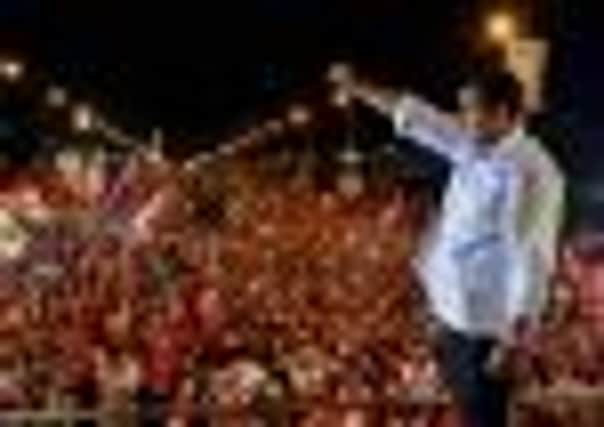Venezuela: Hugo Chavez’s man elected as president


President-elect Nicolas Maduro defeated opponent Henrique Capriles by 50.7 to 49.1 per cent, a far smaller margin than expected, particularly given the 11 per cent by which Chavez defeated the same opponent last October – and the double-digit poll lead the socialist candidate enjoyed throughout the campaign.
The slim victory will put pressure on the new president, a 50-year-old former bus driver who takes charge of a country with myriad economic and social problems.
Advertisement
Hide AdAdvertisement
Hide AdMr Capriles refused to recognise the result and said his team had a list of more than 3,000 irregularities, ranging from gunshots to the illegal re-opening of polling centres. “I didn’t fight against a candidate today, but against the whole abuse of power,” the 40-year-old governor of Miranda state said, as he demanded a recount.
Mr Maduro said he would accept a full recount, but he insisted his victory was clean and dedicated it to Chavez, who died last month.
One key Chavista leader expressed dismay over the outcome of the election, which was supposed to cement the self-styled “Bolivarian Revolution” of their beloved president. National Assembly president Diosdado Cabello, Mr Maduro’s main rival within their movement, tweeted: “The results oblige us to make a profound self-criticism.”
His crowd of supporters, diminutive in comparison to the numbers that Chavez regularly drew, cheered Mr Maduro as he gave his victory speech on Sunday night from in front of his predecessor’s mausoleum.
Red flag-waving Chavistas took to the streets, which were largely deserted as Venezuelans returned to their homes fearing violence following the tensest election campaign the country has witnessed. Blaring their horns and gunning their engines, the revelling motorizados roared up and down the streets as they celebrated six more years of Bolivarian socialism.
By yesterday morning, there was a sombre mood in the city centre’s Plaza Bolívar, where the few shaded benches were sparsely populated around the statue of the Venezuelan liberator, after whom Chavez’s Bolivarian revolution was named.
“It’s a disappointment,” said Carlos Diosrolla, a businessman from central Caracas. “There was a huge amount of faith in Capriles this time. To know we came so close to change during this election makes the waiting more difficult.”
In a corner of the plaza, where Chavistas sat under a red gazebo to watch state television channel VTV, the mood was more jubilant. “We have elected a president to lead us forward, just as El Comandante wanted,” said Angela Sosa, 28, from central Caracas. “If President Maduro stays true to Chavez’s constitution, he will be a good president.”
Advertisement
Hide AdAdvertisement
Hide AdIn Plaza Los Palos Grandes in eastern Caracas, an opposition stronghold, Juan Carlos Palacio, 42, a lawyer and opposition supporter, said: “I don’t believe he’ll last the full six-year term. There’s too much infighting and conflict in the country for him to hold on to power.
“He simply doesn’t have the force of character that Chavez had to hold it all together.”
Rafael Lobo Guerrero, another opposition supporter from eastern Caracas, said: “The country can’t ignore how close the socialists came to losing. It’s only a matter of time before the people realise that Chavez is truly gone.”
Mr Capriles brought over to his side 679,099 of the Venezuelans that voted against him last October. Having campaigned primarily on the issue of crime and violence, his appeals to the poorer Chavistas – the people directly affected by the country’s high murder rate – came close to unseating the socialist party.
Murder rates in Venezuela tripled during Chavez’s 14-year tenure. The country of 20 million people sees more annual homicides than the United States and Europe combined.
“The violence is a daily issue for my family,” said Marcos Garcia, who voted against Mr Capriles last year but backed him this time. “We don’t have much faith in rapid change, but we saw Capriles talking about the violence issue, while all Maduro talked about was Chavez.
“I have no faith in Maduro himself. He talked so much about Chavez that it made me realise he can never replace him.”